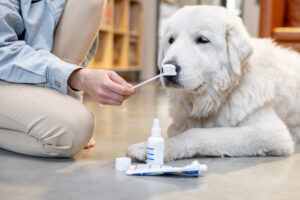The Importance of Dental Health for Pets: How to Maintain Your Pet’s Oral Hygiene
 When it comes to pet care, dental health is often overlooked. However, just like humans, pets require proper oral hygiene to maintain overall health and prevent serious medical issues. Poor dental care can lead to painful infections, tooth loss, and even organ damage if bacteria from the mouth enter the bloodstream. February is National Pet Dental Health Month, making it the perfect time to learn how to keep your furry friend’s teeth in top shape!
When it comes to pet care, dental health is often overlooked. However, just like humans, pets require proper oral hygiene to maintain overall health and prevent serious medical issues. Poor dental care can lead to painful infections, tooth loss, and even organ damage if bacteria from the mouth enter the bloodstream. February is National Pet Dental Health Month, making it the perfect time to learn how to keep your furry friend’s teeth in top shape!
Why Is Dental Health Important for Pets?
Dental disease is one of the most common health issues seen in pets. Studies show that by the age of three, most dogs and cats exhibit some signs of periodontal disease. This condition occurs when plaque and tartar build up on the teeth, leading to gum inflammation, bad breath, and eventually, tooth loss. If left untreated, bacteria from dental infections can spread to the heart, liver, and kidneys, causing life-threatening complications.
Signs of Dental Problems in Pets:
- Bad breath (halitosis) – Persistent foul odor is a key indicator of dental disease.
- Red, swollen, or bleeding gums – This could signal gingivitis or infection.
- Difficulty eating – Pets with sore teeth or gums may drop food, chew on one side, or avoid eating hard kibble.
- Excessive drooling – While some breeds drool more than others, an increase in drooling could indicate oral pain.
- Loose or missing teeth – Advanced periodontal disease can cause teeth to fall out.
How to Maintain Your Pet’s Oral Hygiene
Good dental care doesn’t have to be complicated. By incorporating a few simple habits into your pet’s routine, you can help keep their mouth healthy and free of disease.
1. Brush Your Pet’s Teeth Regularly
Brushing your pet’s teeth is the best way to prevent plaque buildup. Use a pet-specific toothbrush and toothpaste—never human toothpaste, as it contains ingredients like xylitol, which is toxic to pets. Start slow, allowing your pet to get used to the sensation, and aim to brush at least a few times per week for optimal results.
2. Provide Dental Chews and Toys
Many dental chews, treats, and toys are designed to help clean teeth by reducing plaque and tartar. Look for Veterinary Oral Health Council (VOHC) approved products for safe and effective options.
3. Schedule Professional Dental Cleanings
Even with the best at-home care, pets still need regular veterinary dental checkups. A professional cleaning removes tartar from below the gumline, where brushing can’t reach. Your veterinarian will also examine your pet’s mouth for any signs of infection, tumors, or other issues that might go unnoticed.
4. Use Dental Rinses and Water Additives
For pets who resist brushing, antibacterial dental rinses and water additives can help reduce bacteria and freshen breath. While these products are not a substitute for brushing, they are a helpful addition to your pet’s dental routine.
5. Feed a Dental-Friendly Diet
Certain pet foods are formulated to reduce plaque and tartar buildup. Some dry kibble varieties and treats have a special texture that helps scrape teeth clean while chewing. Consult your veterinarian to find the best diet for your pet’s dental and overall health.
Keeping Your Pet’s Smile Healthy for Life
Maintaining your pet’s oral hygiene is a key part of their overall well-being. If you notice signs of dental disease or if your pet has never had a professional dental checkup, now is the perfect time to schedule an appointment. At Affordable Pet Hospital in Tampa, we offer comprehensive dental exams and cleanings to help keep your pet’s smile bright and healthy. Schedule an appointment for your furry friends today by calling 813-991-9898 or requesting an appointment online.

